- The Importance of Customer Relationship Management Software in modern businesses
- Significance of Customer Relationships in Businesses
- Multiple Software utilized in customer relationship management
- The future trends of customer relationship and CRM
In today’s fast-changing business world, one thing remains constant: the importance of the customer. Every successful company/business knows that the key to sustained growth, profitability, and an unassailable market presence is fostering strong and lasting customer relationships.
This is where Customer Relationship Management (CRM) software comes in.
CRM software is a powerful tool that helps you manage customer information and interactions. It’s more than just a database; it helps you understand your customers and keep them happy. With CRM software, you can personalize your marketing, provide great customer service, make informed decisions, and build lasting customer relationships. This software can also help you streamline your business processes, save money, and improve your profits by delivering the best customer experience.
Join us on a journey through the world of CRM software, where we’ll explore how it revolutionizes the way businesses operate and how it’s become a crucial part of modern business. We’ll also provide tips on how to choose the right CRM solution.
Customer Management Platforms

Often referred to as Customer Management Software or Customer Management Systems, they are powerful tools designed to help businesses effectively manage customer interactions. These platforms are vital for maintaining and enhancing customer relationships throughout the customer lifecycle. They offer a centralized system to store, access, and analyze customer information and interactions, allowing businesses to provide more personalized services and drive customer satisfaction.
Key Features of Customer Management Platforms
Customer Management Platforms are equipped with some essential features that can enhance customer experience and satisfaction. Some of these features include:
- Customer Data Management: These platforms enable businesses to collect, store, and manage vast amounts of customer data in one place. This includes contact information, purchase history, communication preferences, and more.
- Contact Management: Customer Management Platforms allow for easy organization and segmentation of customer data, making it simple to target specific customer groups with tailored marketing campaigns and messages.
- Communication Tools: They often include email marketing, social media integration, and other communication tools to help businesses engage with customers across various channels.
- Sales and Lead Management: Customer Management Platforms often feature tools for tracking leads and managing the sales pipeline, which can be crucial for improving sales efficiency.
- Customer Support and Service Tools: Many platforms incorporate customer service features like ticketing systems, knowledge bases, and live chat to enhance the customer support experience.
- Analytics and Reporting: They provide data analysis and reporting capabilities to help businesses gain insights into customer behavior, identify trends, and make informed decisions.
- Integration Capabilities: Customer Management Platforms often integrate with other software applications, such as CRM (Customer Relationship Management) systems, marketing automation tools, and e-commerce platforms, to streamline and automate various processes.
- Automation and Workflow Management: These platforms can automate routine tasks and workflows, such as sending welcome emails to new customers or following up on abandoned shopping carts.
Significance of Customer Relationships in Businesses
Building strong customer relationships is critical for businesses to thrive and succeed in the long run. Let’s explore some of the key benefits of nurturing these valuable connections.
Lower Customer Acquisition Cost (CAC)
Establishing and maintaining strong customer relationships can lower the cost of acquiring new customers. Satisfied customers are more likely to refer others, participate in loyalty programs, or engage with the business through word-of-mouth marketing. This organic growth reduces the need for expensive advertising and marketing efforts to attract new customers.
Company/Brand Reputation
Positive customer relationships can enhance a company’s reputation. In the age of social media and online reviews, customers can significantly influence a business’s perception. A strong reputation can attract new customers; conversely, a poor reputation can deter potential customers.
Data and Personalization
Through CRM systems, businesses can gather valuable data on customer preferences, behavior, and purchasing history. This data enables targeted marketing and personalization, making it easier to acquire new customers by offering them products or services that align with their interests and needs.
Market Research
Customer relationships can provide valuable insights into market trends, competitors, and emerging opportunities. Engaged customers often provide feedback and suggestions, which can inform a company’s product development and marketing strategies to attract new customers.
Repeat Customers
Strong customer relationships foster loyalty, resulting in repeat business. Existing customers are often more profitable than new ones because they tend to spend more and require fewer resources to maintain. They are also more likely to try new products or services from a trusted brand.
Upselling and Cross-Selling
A well-managed customer relationship can enable businesses to upsell or cross-sell additional products or services. By understanding a customer’s needs and preferences, businesses can offer complementary or upgraded products, increasing their average transaction value.
Reduced Customer Churn
Effective CRM practices can help reduce customer churn (customer attrition). When customers feel valued and heard, they are less likely to switch to competitors, leading to more stable and predictable revenue streams.
Stability Customer Base
Strong customer relationships provide a stable customer base, reducing the uncertainty in revenue. This stability is crucial for long-term sustainability, especially during economic downturns or industry disruptions.
Cost Efficiency
Maintaining existing customer relationships is often more cost-effective than constantly acquiring new ones. Customer retention is typically less expensive than customer acquisition, making it a vital component of sustainable business growth.
Innovation and Adaptation
Engaged customers can provide valuable feedback, insights, and ideas that drive innovation and adaptation. This responsiveness to changing customer needs and preferences is essential for long-term competitiveness.
Customer Management Software Recommendation
At Acquira, we’ve worked with a lot of different CRMs. Many of the businesses we acquire come with existing CRMs, and we have CRMs that we’ve repurposed for our various training programs. In fact, we’ve even built our own proprietary CRM that we use in-house at Acquira.
So let’s take a look at some of the more popular CRMs on the market.
Close
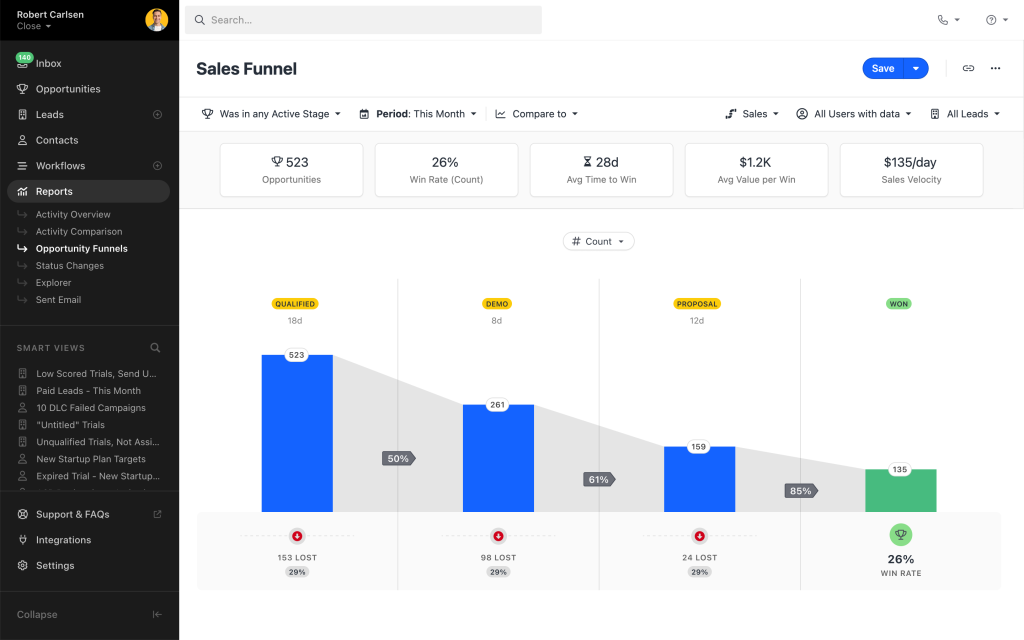
Close is a robust CRM platform that focuses on sales and lead management. It offers email automation, predictive dialing, and reporting tools to streamline sales processes. Close is known for its powerful sales communication features, making it a great choice for sales-driven businesses. Acquira uses Close for its own lead-management purposes.
ClickUp
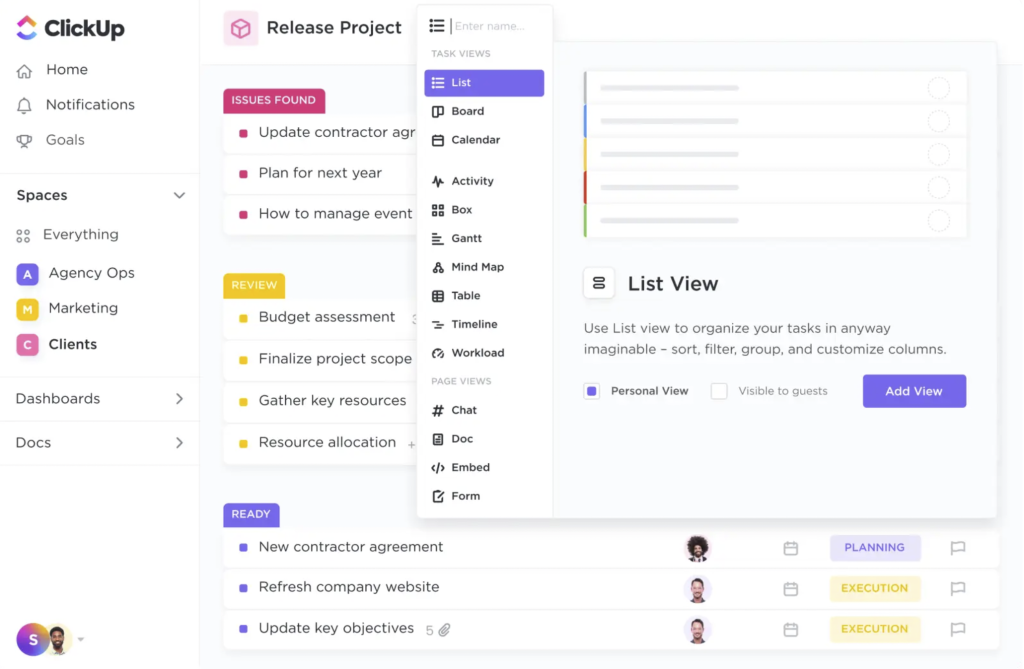
ClickUp is primarily a project management and productivity software. While it’s not a traditional CRM, it can be customized to manage customer-related tasks and projects. It’s versatile and suitable for businesses looking for an all-in-one solution that combines project management, task tracking, and CRM-like features. Acquira has repurposed ClickUp as a CRM to manage our partners’ acquisition journeys. It is a robust and powerful solution with enough customization that we’ve found it quite useful.
Trello
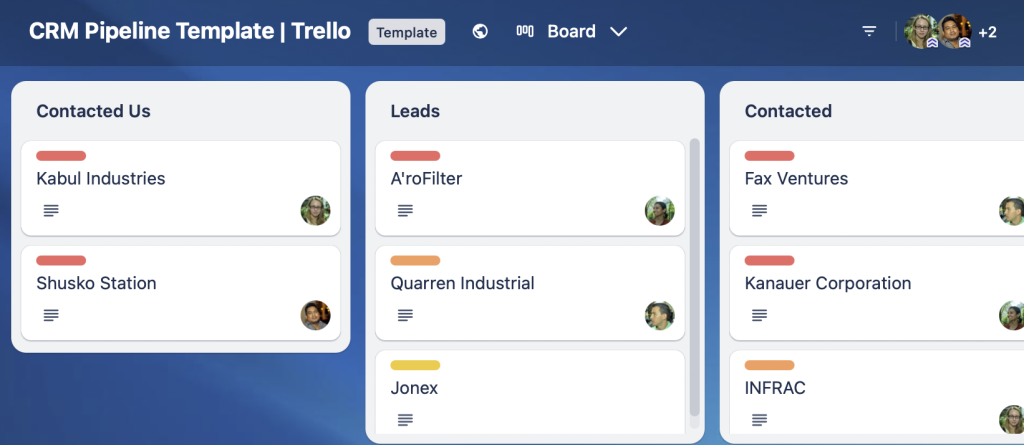
Trello is a widely used project management and task tracking tool with a user-friendly interface.
While not a CRM, it’s ideal for businesses that need a simple way to manage customer-related projects and tasks. Trello’s boards and cards can be adapted to suit various CRM-like workflows.
HubSpot CRM
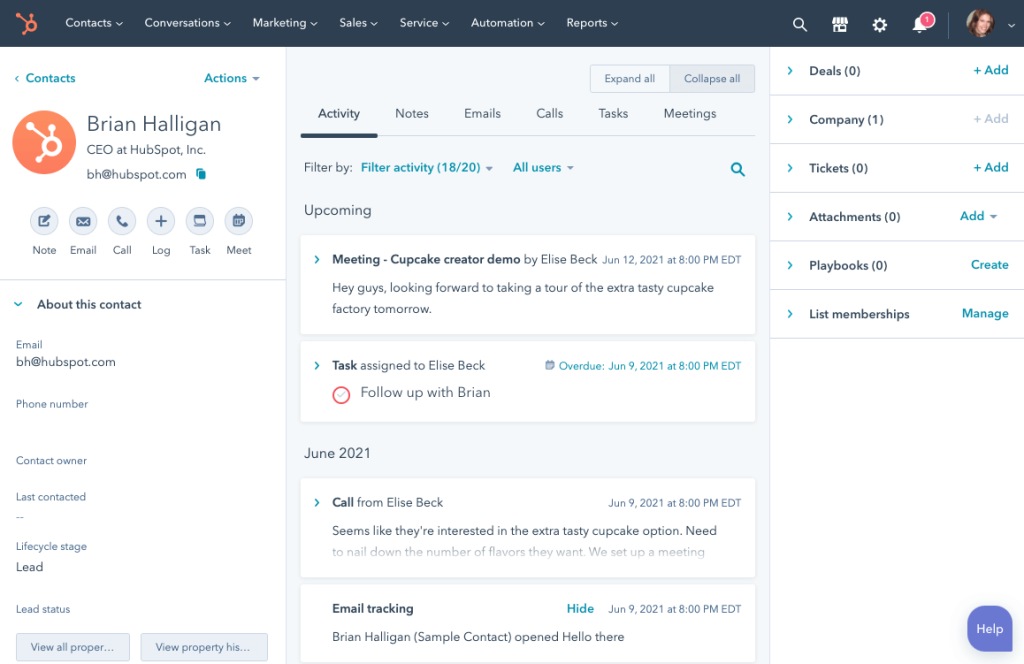
HubSpot offers a free CRM that provides contact management, lead tracking, and sales automation tools. It integrates seamlessly with other HubSpot marketing and sales tools for a comprehensive customer management solution.
Zoho CRM
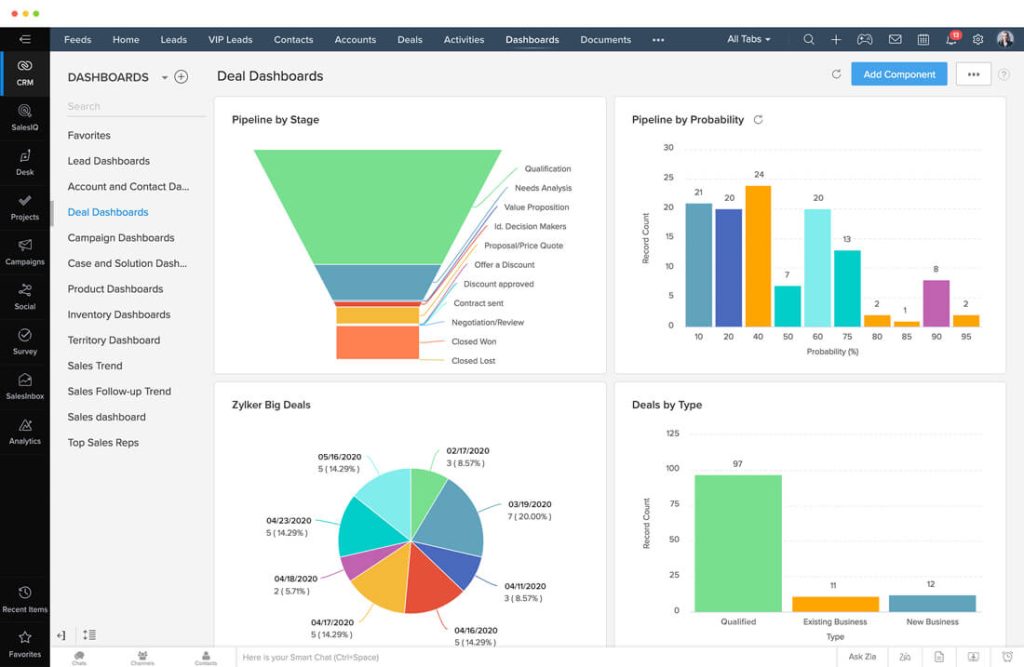
Zoho CRM is a cloud-based CRM platform with a wide range of features, including lead management, contact organization, sales automation, and email marketing. It’s known for its affordability and scalability, making it suitable for businesses of all sizes.
Pipedrive
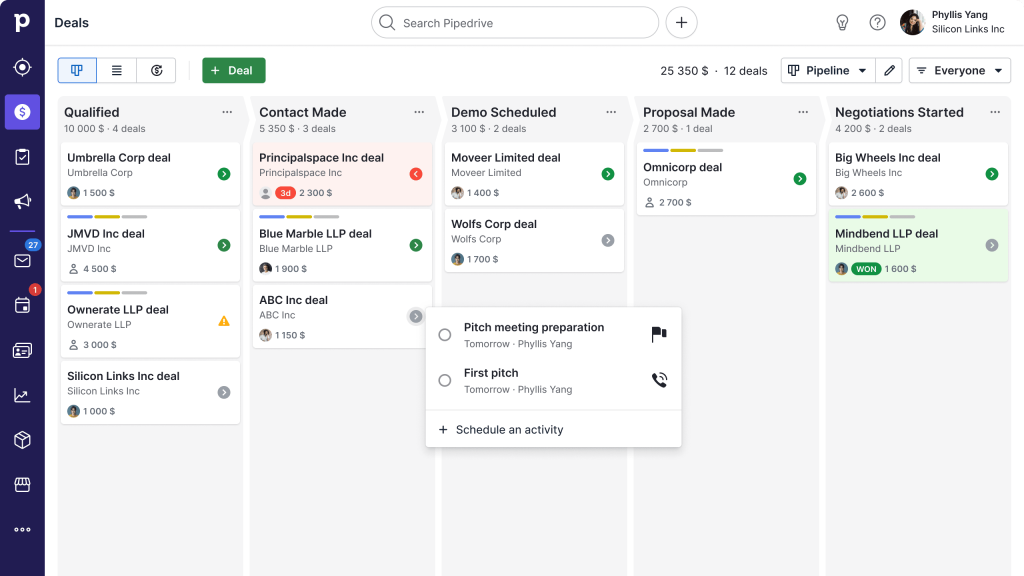
Pipedrive is a CRM designed for sales teams and pipeline management. It offers customizable sales processes, lead tracking, and forecasting tools. Pipedrive focuses on helping businesses close deals more efficiently.
Freshsales
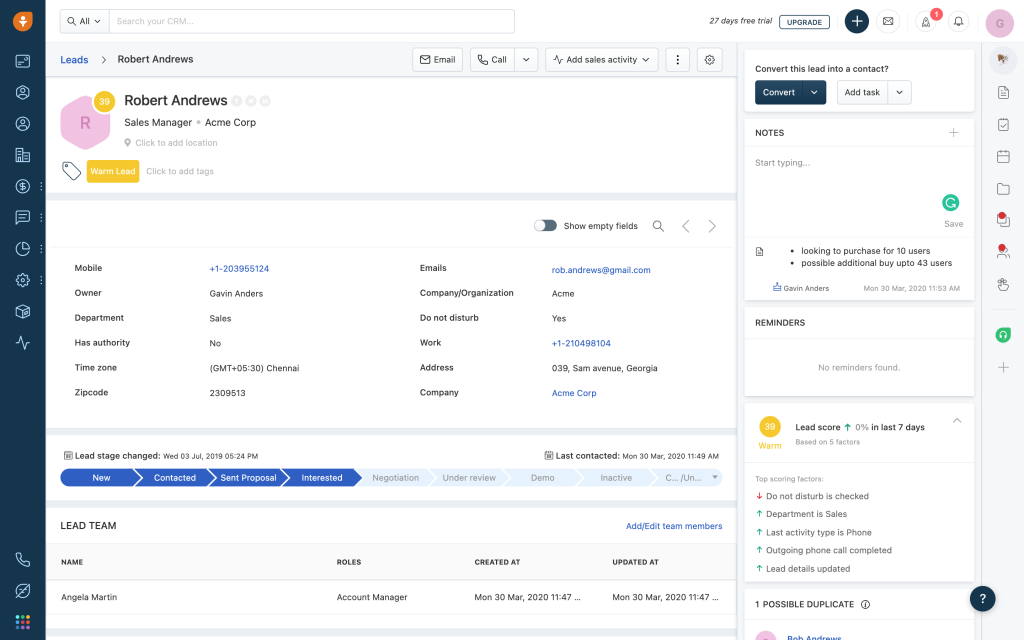
Freshsales, by Freshworks, is another CRM system that simplifies lead management, email tracking, and analytics. It’s suitable for small to medium-sized businesses and offers automation features to streamline sales processes.
Zendesk Sell (formerly Base)
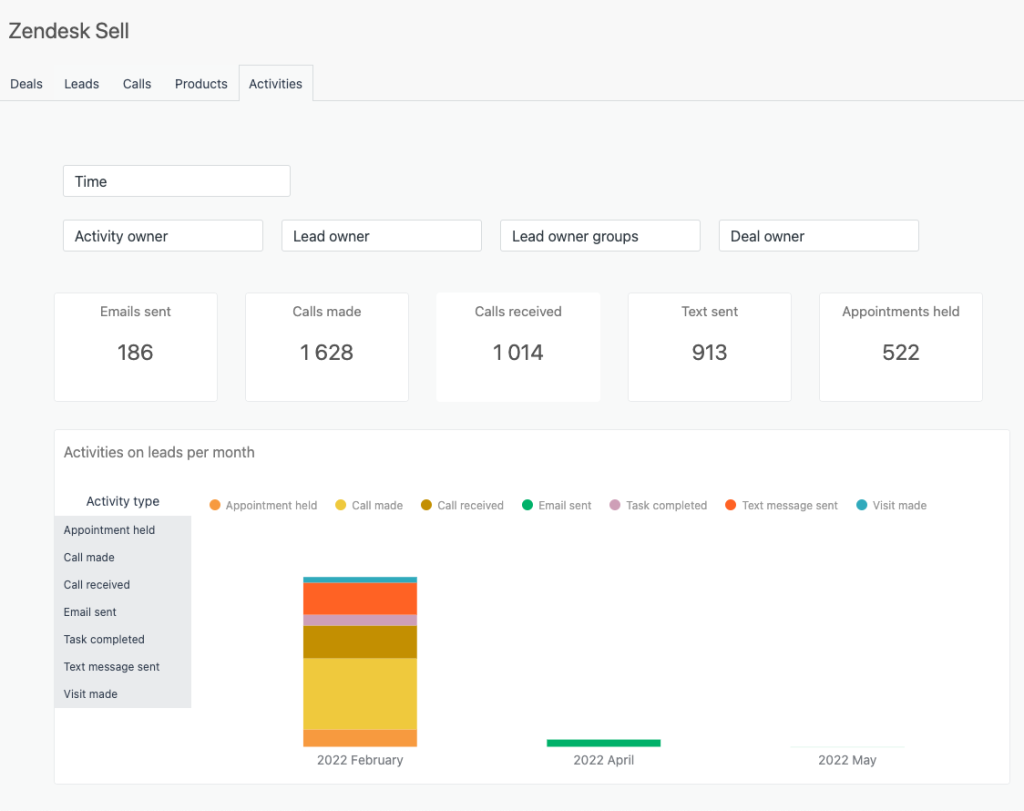
Zendesk Sell is a sales CRM with lead and contact management, email automation, and reporting features. It’s designed to help sales teams effectively manage customer interactions and close deals.
Salesforce

Salesforce is a comprehensive CRM platform known for its versatility. It offers a wide range of features, including sales automation, customer service, and marketing automation. Salesforce is ideal for larger enterprise. Acquira has encountered with Salesforce at many of the companies we work with. It is quite popular with home services companies.
Future Trends in Customer Relationship
The world of Customer Relationship Management (CRM) is booming, and technology is at the forefront of this change. Customers now expect businesses to be more intuitive and understand their needs even before they express them.
To achieve this, two prominent trends in CR have emerged: AI-powered personalization and chatbots for efficient customer support. These trends aim to provide customers with tailored experiences that meet their individual preferences and the convenience of chatbots for quick and easy support.
Customers now demand that businesses offer seamless experiences across multiple channels, whether online, in-store, or on social media. They want the same level of engagement, no matter the channel they choose. These customers are also becoming more conscious of businesses’ impact on the environment and society. They’re looking for companies that share their values and contribute positively to the community.
Data privacy and security issues have also become an important issue for customers. They want businesses to prioritize data protection and be transparent about how their data is used and protected.
Finally, hyper-personalization is rising, and customers want unique experiences catering to their individual needs and preferences.
To keep up with these ever-evolving customer expectations, businesses must adapt and invest in technology while keeping the customer at the center of their CR initiatives.
Conclusion
Building and maintaining strong customer relationships is vital for businesses to thrive and succeed in today’s competitive market. By fostering long-lasting customer relationships, businesses can reduce customer acquisition costs, increase revenue through repeat business and upselling, and better withstand market challenges.
Customer Management Platforms became indispensable for businesses of all sizes and industries.
Because of that, customer Management Platforms became indispensable for businesses of all sizes and industries. They improve operational efficiency, help businesses provide a better customer experience, and drive revenue growth by enabling personalized and targeted marketing efforts.
There are multiple customer management software available, but choosing between them highly depends on your business’s specific needs and preferences. Consider the size of your business, your budget, and the customization and automation you require when selecting.
Customer Relationship Management software is an integral tool for any business, but the first step is acquiring a business.
Acquira’s Accelerator+ Program is designed to help you reach an LOI (Letter of Intent) within four months. Acquira’s team will conduct a thorough search for you based on your unique investment thesis, followed by performing due diligence, negotiating the LOI, and presenting it for your signature.
Moreover, the program provides access to world-class MBA-level training materials and a vibrant community of Acquisition Entrepreneurs, including Acquira’s team of acquisition experts. Act quickly, as space in the program is extremely limited. Fill out the form below to see if you’re eligible.
Key Takeaways
- CRMs allow businesses to build strong and personalized connections with customers, making them feel valued and appreciated.
- A successful CRM relies on customer data to personalize, resolve issues efficiently, and make strategic decisions to strengthen relationships and drive long-term success.
- CRM software centralizes customer data, personalizes interactions, enhances customer service, and boosts long-term business success.
- KPIs provide measurable and quantifiable metrics that help businesses assess their current performance in managing and enhancing customer relationships.
- As technology evolves, customer expectations continue to rise, and businesses must invest in technology to keep up while prioritizing customers in their CR initiatives.
Acquira specializes in seamless business succession and acquisition. We guide entrepreneurs in acquiring businesses and investing in their growth and success. Our focus is on creating a lasting, positive impact for owners, employees, and the community through each transition.



